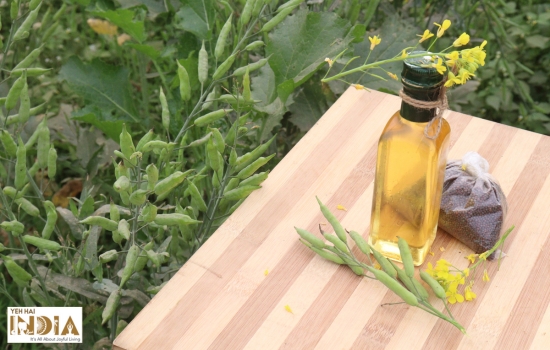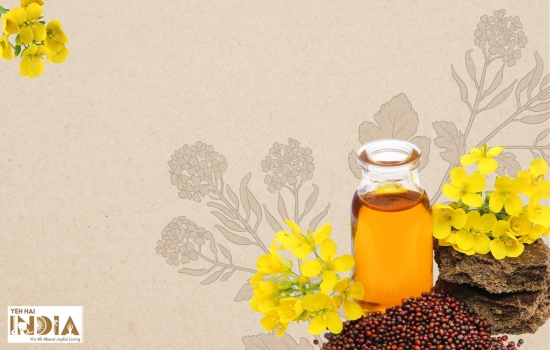Mustard oil, derived from the seeds of the mustard plant, has been a staple in culinary and traditional medicine for generations. Its strong, pungent scent and vivid yellow tint make it a component in various cuisines worldwide.
Mustard oil’s historical and cultural importance extends beyond the kitchen, as it is deeply ingrained in cultural and historical practices. Origins can be traced back to ancient Ayurvedic practices, where it was believed to have warming powers and was used for massages called “abhyanga.”
Mustard oil is a common ingredient in pickles and curries in certain Asian nations and is renowned in African and Mediterranean countries for its distinct flavour when incorporated into dressings and marinades.
While studies on its potential health benefits continue, mustard oil’s importance as a culinary and medicinal oil is undeniable.
Mustard Oil Extraction Method
Mustard oil extraction is a time-consuming process that involves washing and crushing mustard seeds, then subjecting them to cold pressing at temperatures below 120°F (49°C) to preserve their natural components and nutritional value.
This cold pressing technique preserves the sensory qualities and potential health benefits of mustard oil.
Strong aroma and pungent flavour
Mustard oil’s robust, pungent flavour and unique fragrance are due to glucosinolates found in mustard seeds.
When crushed or ground, myrosinase enzyme reacts with these glucosinolates, forming pungent chemicals like allyl isothiocyanate, giving it its distinctive flavour and smell.
Mustard oil has health advantages due to its distinct flavour, scent, and extraction method, making it a beloved ingredient in kitchens throughout the world, adding depth and character to a variety of recipes.
Nutritional Composition of Mustard Oil

Mustard oil has a unique nutritional profile that adds to its culinary and possible health advantages. The nutritional breakdown reveals a combination of good fats and necessary chemicals.
This oil is a nutritious blend with a unique nutritional profile, containing beneficial monounsaturated and polyunsaturated fats that are essential for heart health and cholesterol management.
Monounsaturated fats, particularly oleic acid, have been associated with lower LDL cholesterol, or “bad” cholesterol.
Vitamin E, a powerful antioxidant, is also present in this oil, with tocopherols being a type of vitamin E. These antioxidants fight free radicals and may improve general health.
Additionally, mustard oil contains omega-3 fatty acids, which are vital for good health, contributing to cardiovascular health and brain function.
Research in the journal “Lipids in Health and Disease” highlights the presence of alpha-linolenic acid (ALA), a type of omega-3 fatty acid, in mustard oil. Overall, mustard oil offers a healthy and delicious option for those seeking a healthy and delicious alternative to traditional oils.
Recommended Article: Cold-Pressed Oils: Are They Healthy & Worth the Hype?
Mustard Oil’s Culinary Magic and Versatility
Mustard oil is a culinary wonder that goes beyond its nutritional qualities to add a distinct and enticing flavour to foods. It is integral to regional cuisines due to its strong odour and unique flavour, which adds to the integrity of regional recipes.
1. Traditional foods and pickles
Mustard oil is used for traditional foods and pickles, providing a characteristic punch to various dishes. The rich flavours of Indian dishes like “Sarson da Saag” and “Bengali Fish Curry” are owed to this oil.
Its antibacterial characteristics make it an attractive option for pickle preservation, ensuring a delightful and long-lasting tang.
2. Marinades and Sauces
Mustard oil’s distinctive properties extend to marinades and dressing components, as its strong flavour infuses marinades for meats and vegetables with character.
3. Improving Flavours, Creating Distinction
Mustard oil’s pungent, peppery flavour gives depth to dishes, distinguishing them from those made with softer oils.
This oil is a culinary wonder, transforming dishes from classic curries to new inventions. Its ability to modify and intensify flavours is supported by both heritage and science, making it a vital contribution to the culinary world.
Cardiovascular Health Benefits of Mustard Oil
| Omega-3 fatty acids | Reduces inflammation Improves blood flow Lower cholesterol levels Reduce the risk of heart disease and stroke |
| Improves lipid profiles | Increases levels of HDL (good cholesterol) Reduces levels of LDL (bad cholesterol) |
| Reduces cholesterol levels | Increases bile acid production which further breaks down cholesterol and removes it from the body |
Digestive Health Benefits of Mustard Oil
| Pungent properties | Stimulates digestive juices production, like bile and stomach acid Improves gut health Helps in relieving constipation, bloating, and other digestive problems |
| Improves gut health | Increases the number of beneficial bacteria in the gut. |
Skin and Hair Care Benefits of Mustard Oil
| Fatty acids Keep hair and skin healthy | Moisturizes, nourishes, and protects skin by preventing moisture loss Condition hair and make it soft and shiny. |
| Antioxidants Protect the skin and hair from damage | Keeps hair and skin healthy and young |
| Dilate blood vessels and increase blood flow to the scalp | Prevents hair loss Nourishes hair follicles and promotes hair growth |
Anti-microbial and Anti-inflammatory Properties of Mustard Oil
Anti-microbial and anti-inflammatory compounds of mustard oil:
Allyl isothiocyanate blocks the production of inflammatory molecules and kills bacteria and fungi.
Sinigrin breaks down into allyl isothiocyanate when it is ingested or applied to the skin.
Glucosinolates are found in many cruciferous vegetables, including mustard seeds. They are thought to have anti-cancer properties.
Effect of Anti-microbial and anti-inflammatory compounds Beneficial For Reduce inflammation throughout the body Arthritis, asthma, and eczema Fight off infections caused by bacteria, viruses, and fungi Sore throat, ear infection, and skin infection
To summarise,
Mustard oil is a versatile component, with applications ranging from enhancing the tastes of traditional foods, pickles, and sauces to treating skin issues and infections. Its beneficial effects on cardiovascular health, anti-inflammatory and antibacterial abilities, digestive support, and contributions to good skin and hair highlight its extensive list of advantages.
Consider integrating this oil into your everyday routine as you explore the world of culinary and health options. Whether you want to add a distinctive flavour to your dishes or seek natural solutions for skin and hair care, mustard oil’s potential is worth exploring.
Remember that, like with any dietary or wellness adjustment, it’s best to speak with a specialist to verify it fits your specific needs and health objectives.
By incorporating mustard oil into your cooking and self-care routines, you not only add depth and flavour to your food but also access a natural source of well-being. So, as you begin on this road of improved health and enhanced tastes, make room for this incredible oil in your diet.
Sources
- Journal of the American Oil Chemists’ Society. 2015. Nutritional and Health Aspects of Mustard Oil: A Brief Review.
- European Journal of Lipid Science and Technology. 2007. Vitamin E content in vegetable oils: Inference of nutritional and storage aspects.
- Journal of Medicinal Food. 2016. Anti-Inflammatory and Antibacterial Effects of Mustard Oil (Brassica juncea).
- Journal of Food Science and Technology. 2015. The role of mustard oil in cardiovascular disease.
- Journal of the American Oil Chemists’ Society. 2018. Sensory, physico-chemical and shelf stability evaluation of pre-packaged mustard oil.
- Lipids in Health and Disease. 2017. Omega-3 fatty acid alpha-linolenic acid (ALA) is a potent anti-inflammatory lipid.










